Developing Intercultural Competence for Business Success
VerifiedAdded on 2023/06/18
|10
|2202
|318
Report
AI Summary
This report examines the importance of intercultural competence in international business, focusing on a case study involving John Smith and his interactions in the Persian Gulf. It identifies John's missteps due to cultural differences and offers suggestions for improving his cross-cultural understanding, including awareness of diverse attitudes and the need for precise communication. The report also explores intercultural theories such as cultural convergence, communication accommodation theory, and co-cultural theory, providing advice to John on effective communication and relationship building. The conclusion emphasizes the necessity of understanding cultural values and ethics when conducting business in different countries, highlighting how John's perceived disconnect with his father negatively impacted his business deal. Recommendations include developing strong relationships, gathering relevant cultural data, and actively listening to cultural nuances to overcome cross-cultural conflicts. Desklib provides this report along with a suite of study tools to aid students.
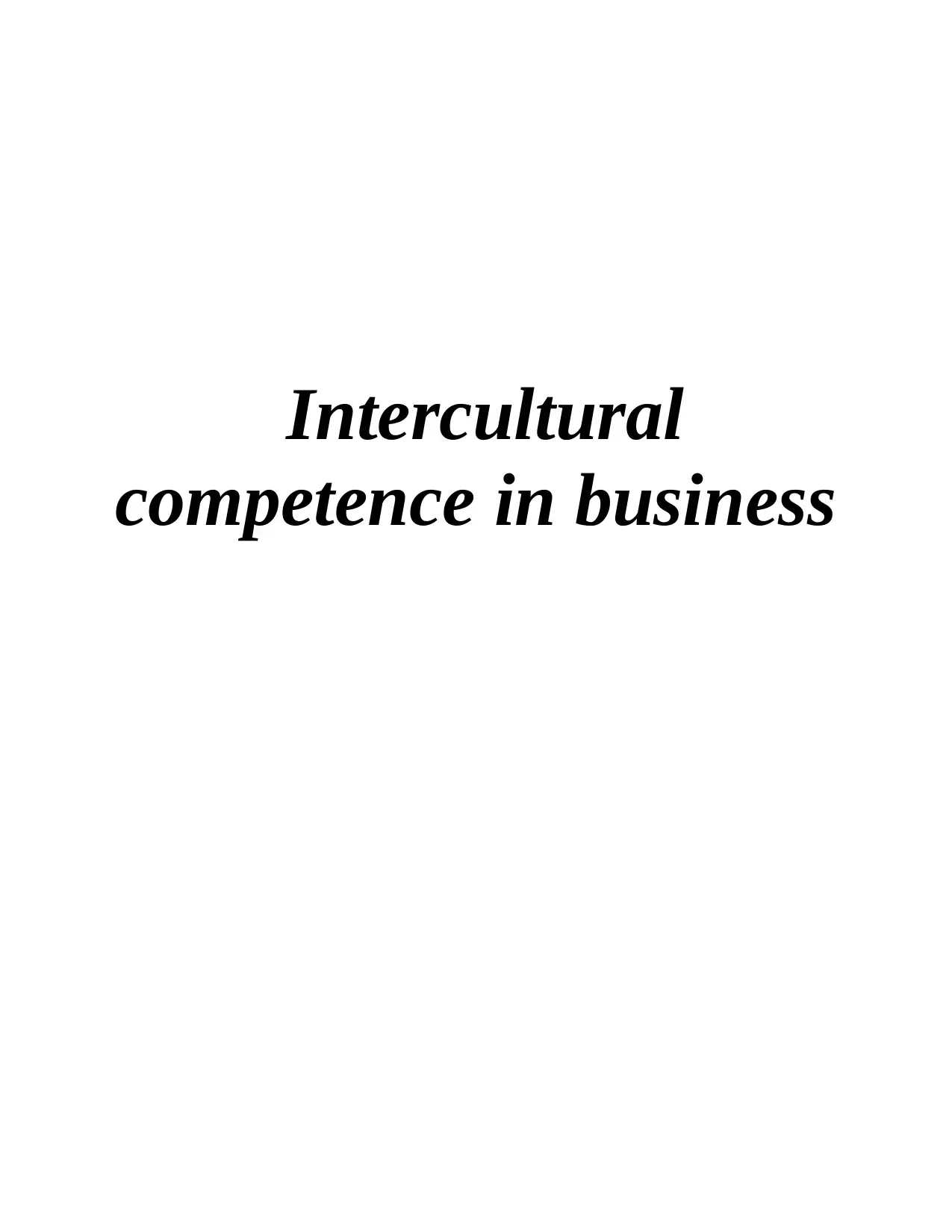
Intercultural
competence in business
competence in business
Paraphrase This Document
Need a fresh take? Get an instant paraphrase of this document with our AI Paraphraser
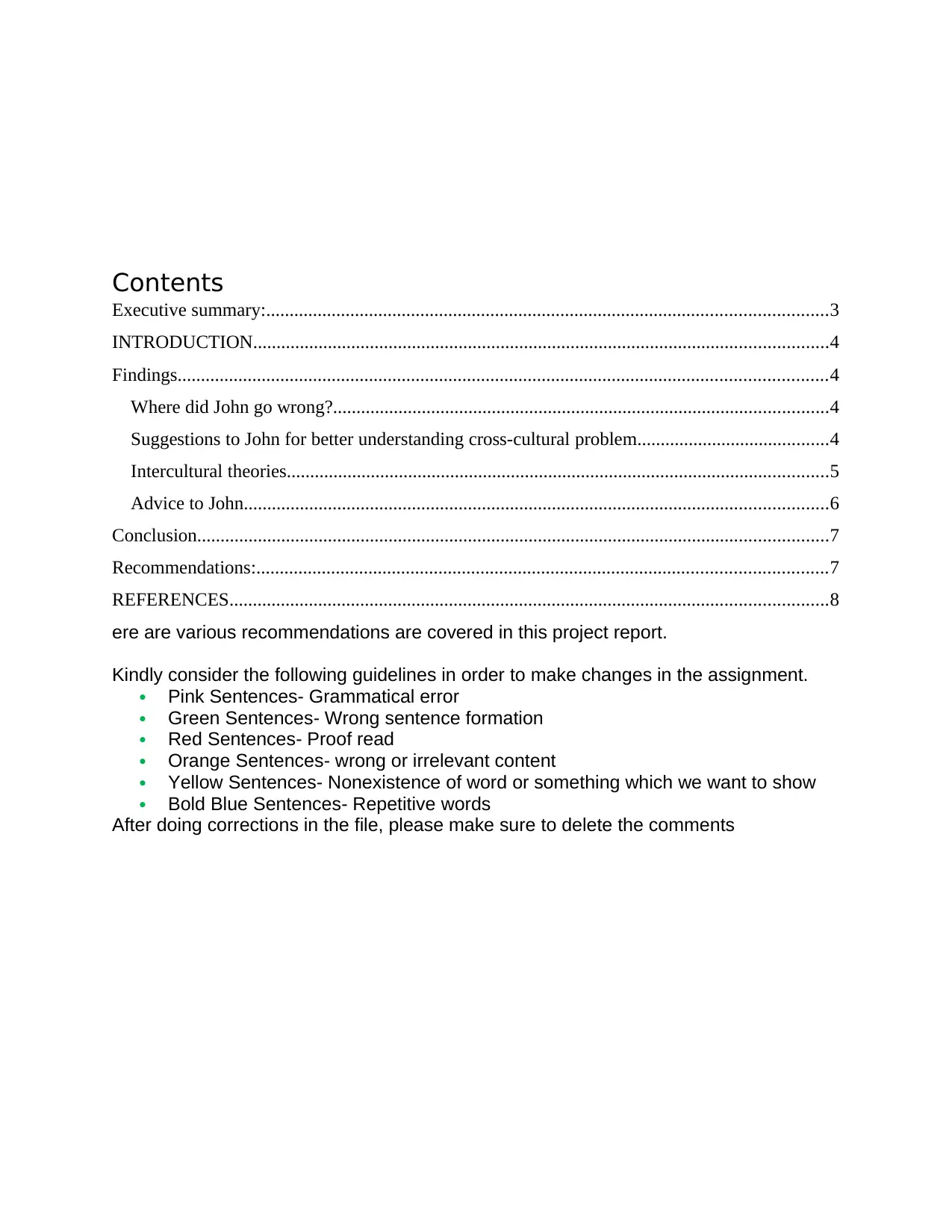
Contents
Executive summary:........................................................................................................................3
INTRODUCTION...........................................................................................................................4
Findings...........................................................................................................................................4
Where did John go wrong?..........................................................................................................4
Suggestions to John for better understanding cross-cultural problem.........................................4
Intercultural theories....................................................................................................................5
Advice to John.............................................................................................................................6
Conclusion.......................................................................................................................................7
Recommendations:..........................................................................................................................7
REFERENCES................................................................................................................................8
ere are various recommendations are covered in this project report.
Kindly consider the following guidelines in order to make changes in the assignment.
Pink Sentences- Grammatical error
Green Sentences- Wrong sentence formation
Red Sentences- Proof read
Orange Sentences- wrong or irrelevant content
Yellow Sentences- Nonexistence of word or something which we want to show
Bold Blue Sentences- Repetitive words
After doing corrections in the file, please make sure to delete the comments
Executive summary:........................................................................................................................3
INTRODUCTION...........................................................................................................................4
Findings...........................................................................................................................................4
Where did John go wrong?..........................................................................................................4
Suggestions to John for better understanding cross-cultural problem.........................................4
Intercultural theories....................................................................................................................5
Advice to John.............................................................................................................................6
Conclusion.......................................................................................................................................7
Recommendations:..........................................................................................................................7
REFERENCES................................................................................................................................8
ere are various recommendations are covered in this project report.
Kindly consider the following guidelines in order to make changes in the assignment.
Pink Sentences- Grammatical error
Green Sentences- Wrong sentence formation
Red Sentences- Proof read
Orange Sentences- wrong or irrelevant content
Yellow Sentences- Nonexistence of word or something which we want to show
Bold Blue Sentences- Repetitive words
After doing corrections in the file, please make sure to delete the comments
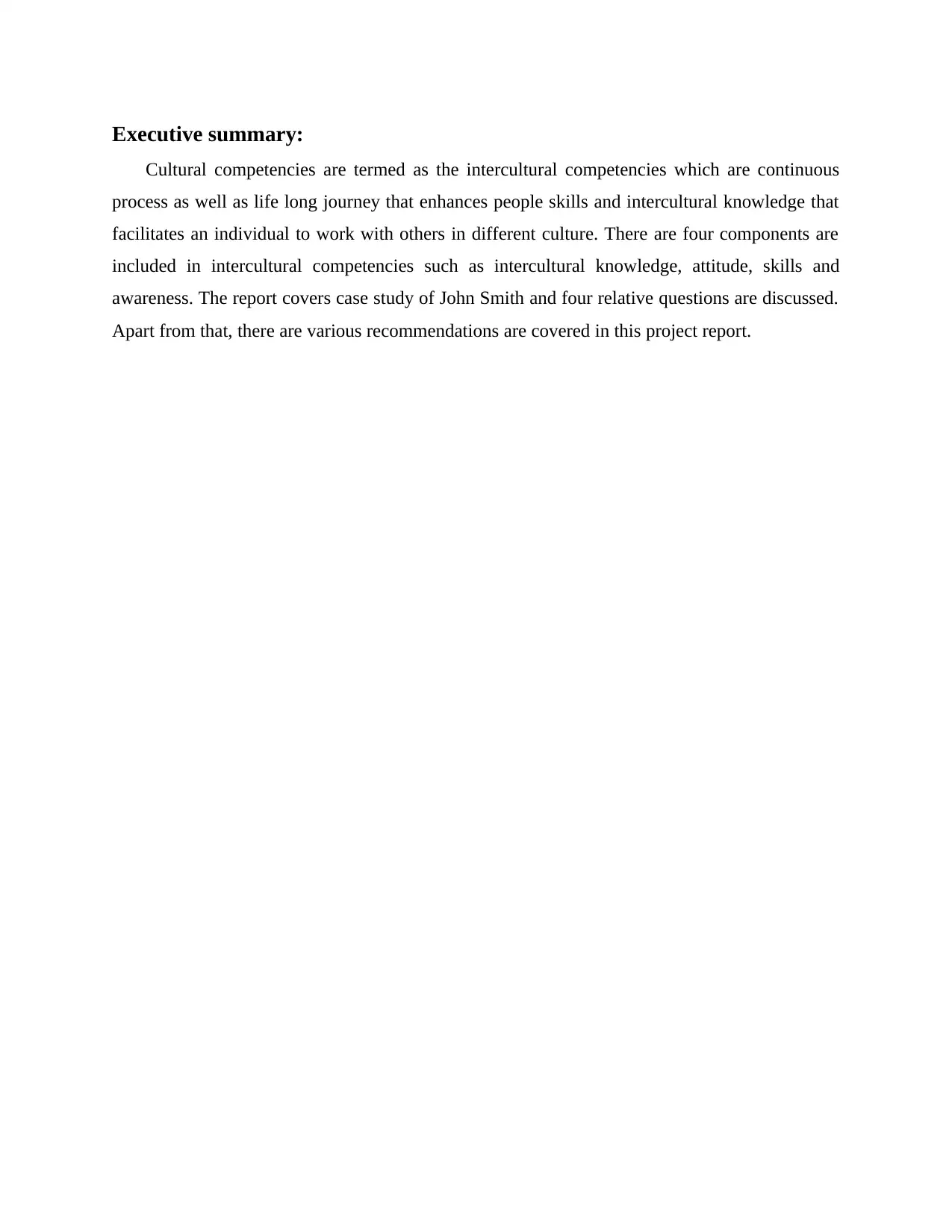
Executive summary:
Cultural competencies are termed as the intercultural competencies which are continuous
process as well as life long journey that enhances people skills and intercultural knowledge that
facilitates an individual to work with others in different culture. There are four components are
included in intercultural competencies such as intercultural knowledge, attitude, skills and
awareness. The report covers case study of John Smith and four relative questions are discussed.
Apart from that, there are various recommendations are covered in this project report.
Cultural competencies are termed as the intercultural competencies which are continuous
process as well as life long journey that enhances people skills and intercultural knowledge that
facilitates an individual to work with others in different culture. There are four components are
included in intercultural competencies such as intercultural knowledge, attitude, skills and
awareness. The report covers case study of John Smith and four relative questions are discussed.
Apart from that, there are various recommendations are covered in this project report.
⊘ This is a preview!⊘
Do you want full access?
Subscribe today to unlock all pages.

Trusted by 1+ million students worldwide
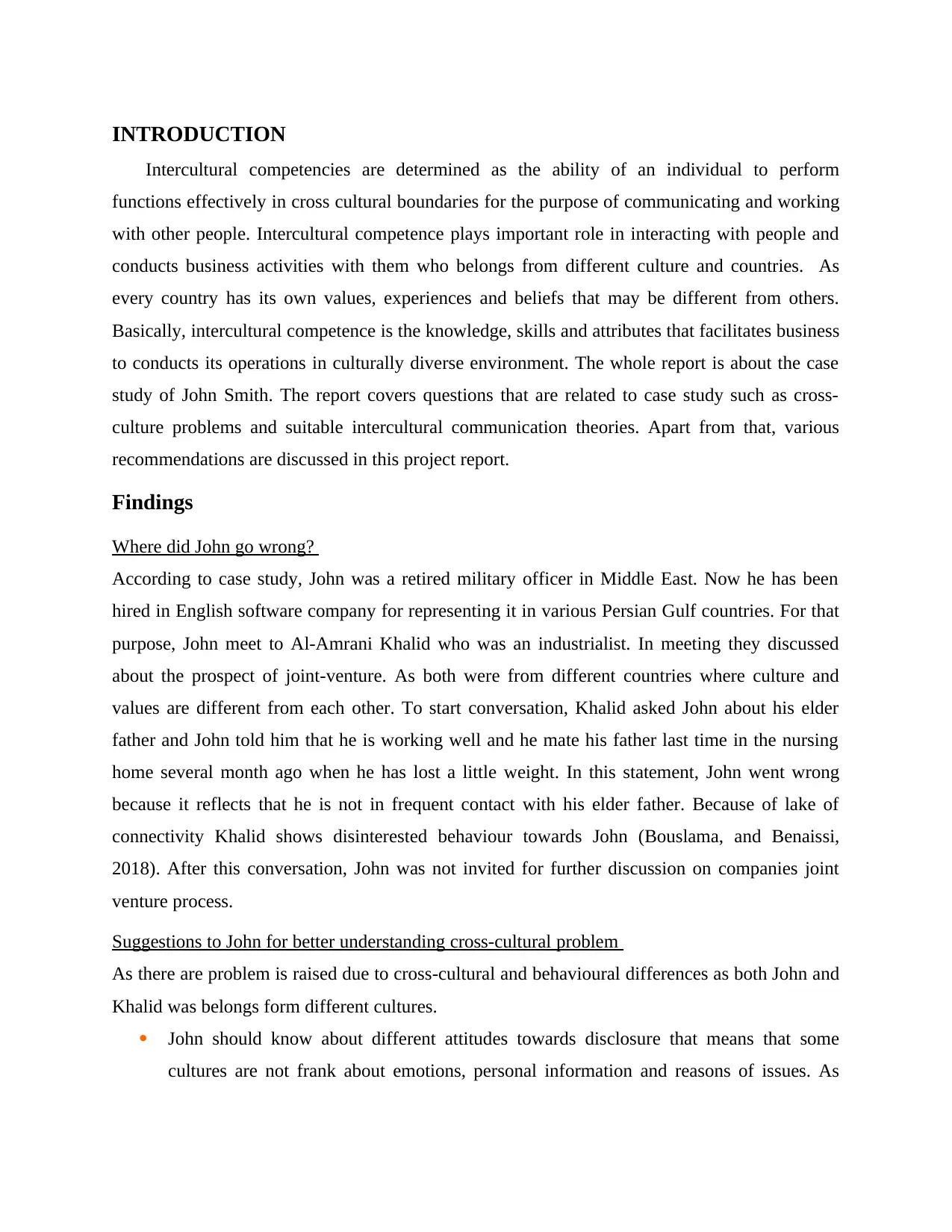
INTRODUCTION
Intercultural competencies are determined as the ability of an individual to perform
functions effectively in cross cultural boundaries for the purpose of communicating and working
with other people. Intercultural competence plays important role in interacting with people and
conducts business activities with them who belongs from different culture and countries. As
every country has its own values, experiences and beliefs that may be different from others.
Basically, intercultural competence is the knowledge, skills and attributes that facilitates business
to conducts its operations in culturally diverse environment. The whole report is about the case
study of John Smith. The report covers questions that are related to case study such as cross-
culture problems and suitable intercultural communication theories. Apart from that, various
recommendations are discussed in this project report.
Findings
Where did John go wrong?
According to case study, John was a retired military officer in Middle East. Now he has been
hired in English software company for representing it in various Persian Gulf countries. For that
purpose, John meet to Al-Amrani Khalid who was an industrialist. In meeting they discussed
about the prospect of joint-venture. As both were from different countries where culture and
values are different from each other. To start conversation, Khalid asked John about his elder
father and John told him that he is working well and he mate his father last time in the nursing
home several month ago when he has lost a little weight. In this statement, John went wrong
because it reflects that he is not in frequent contact with his elder father. Because of lake of
connectivity Khalid shows disinterested behaviour towards John (Bouslama, and Benaissi,
2018). After this conversation, John was not invited for further discussion on companies joint
venture process.
Suggestions to John for better understanding cross-cultural problem
As there are problem is raised due to cross-cultural and behavioural differences as both John and
Khalid was belongs form different cultures.
John should know about different attitudes towards disclosure that means that some
cultures are not frank about emotions, personal information and reasons of issues. As
Intercultural competencies are determined as the ability of an individual to perform
functions effectively in cross cultural boundaries for the purpose of communicating and working
with other people. Intercultural competence plays important role in interacting with people and
conducts business activities with them who belongs from different culture and countries. As
every country has its own values, experiences and beliefs that may be different from others.
Basically, intercultural competence is the knowledge, skills and attributes that facilitates business
to conducts its operations in culturally diverse environment. The whole report is about the case
study of John Smith. The report covers questions that are related to case study such as cross-
culture problems and suitable intercultural communication theories. Apart from that, various
recommendations are discussed in this project report.
Findings
Where did John go wrong?
According to case study, John was a retired military officer in Middle East. Now he has been
hired in English software company for representing it in various Persian Gulf countries. For that
purpose, John meet to Al-Amrani Khalid who was an industrialist. In meeting they discussed
about the prospect of joint-venture. As both were from different countries where culture and
values are different from each other. To start conversation, Khalid asked John about his elder
father and John told him that he is working well and he mate his father last time in the nursing
home several month ago when he has lost a little weight. In this statement, John went wrong
because it reflects that he is not in frequent contact with his elder father. Because of lake of
connectivity Khalid shows disinterested behaviour towards John (Bouslama, and Benaissi,
2018). After this conversation, John was not invited for further discussion on companies joint
venture process.
Suggestions to John for better understanding cross-cultural problem
As there are problem is raised due to cross-cultural and behavioural differences as both John and
Khalid was belongs form different cultures.
John should know about different attitudes towards disclosure that means that some
cultures are not frank about emotions, personal information and reasons of issues. As
Paraphrase This Document
Need a fresh take? Get an instant paraphrase of this document with our AI Paraphraser
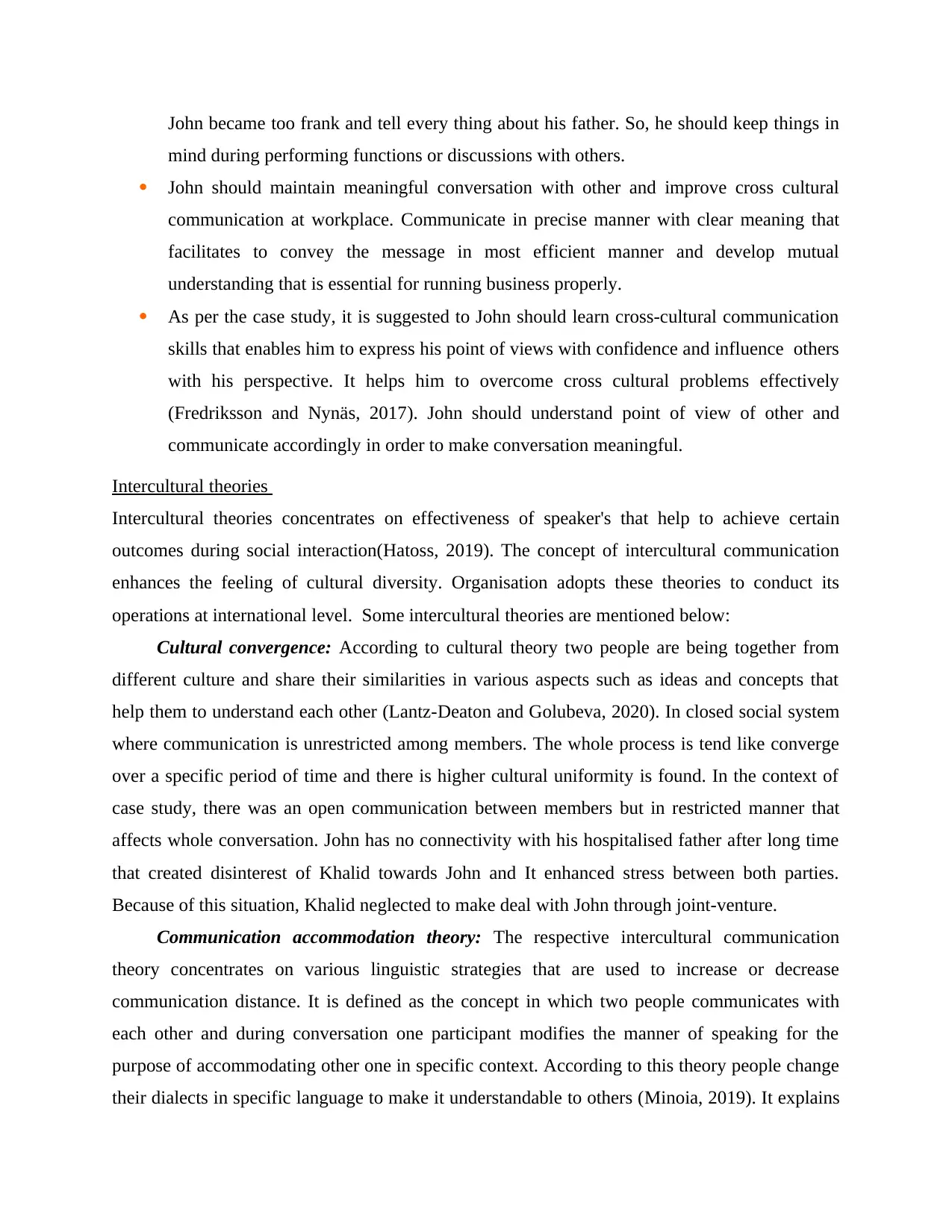
John became too frank and tell every thing about his father. So, he should keep things in
mind during performing functions or discussions with others.
John should maintain meaningful conversation with other and improve cross cultural
communication at workplace. Communicate in precise manner with clear meaning that
facilitates to convey the message in most efficient manner and develop mutual
understanding that is essential for running business properly.
As per the case study, it is suggested to John should learn cross-cultural communication
skills that enables him to express his point of views with confidence and influence others
with his perspective. It helps him to overcome cross cultural problems effectively
(Fredriksson and Nynäs, 2017). John should understand point of view of other and
communicate accordingly in order to make conversation meaningful.
Intercultural theories
Intercultural theories concentrates on effectiveness of speaker's that help to achieve certain
outcomes during social interaction(Hatoss, 2019). The concept of intercultural communication
enhances the feeling of cultural diversity. Organisation adopts these theories to conduct its
operations at international level. Some intercultural theories are mentioned below:
Cultural convergence: According to cultural theory two people are being together from
different culture and share their similarities in various aspects such as ideas and concepts that
help them to understand each other (Lantz-Deaton and Golubeva, 2020). In closed social system
where communication is unrestricted among members. The whole process is tend like converge
over a specific period of time and there is higher cultural uniformity is found. In the context of
case study, there was an open communication between members but in restricted manner that
affects whole conversation. John has no connectivity with his hospitalised father after long time
that created disinterest of Khalid towards John and It enhanced stress between both parties.
Because of this situation, Khalid neglected to make deal with John through joint-venture.
Communication accommodation theory: The respective intercultural communication
theory concentrates on various linguistic strategies that are used to increase or decrease
communication distance. It is defined as the concept in which two people communicates with
each other and during conversation one participant modifies the manner of speaking for the
purpose of accommodating other one in specific context. According to this theory people change
their dialects in specific language to make it understandable to others (Minoia, 2019). It explains
mind during performing functions or discussions with others.
John should maintain meaningful conversation with other and improve cross cultural
communication at workplace. Communicate in precise manner with clear meaning that
facilitates to convey the message in most efficient manner and develop mutual
understanding that is essential for running business properly.
As per the case study, it is suggested to John should learn cross-cultural communication
skills that enables him to express his point of views with confidence and influence others
with his perspective. It helps him to overcome cross cultural problems effectively
(Fredriksson and Nynäs, 2017). John should understand point of view of other and
communicate accordingly in order to make conversation meaningful.
Intercultural theories
Intercultural theories concentrates on effectiveness of speaker's that help to achieve certain
outcomes during social interaction(Hatoss, 2019). The concept of intercultural communication
enhances the feeling of cultural diversity. Organisation adopts these theories to conduct its
operations at international level. Some intercultural theories are mentioned below:
Cultural convergence: According to cultural theory two people are being together from
different culture and share their similarities in various aspects such as ideas and concepts that
help them to understand each other (Lantz-Deaton and Golubeva, 2020). In closed social system
where communication is unrestricted among members. The whole process is tend like converge
over a specific period of time and there is higher cultural uniformity is found. In the context of
case study, there was an open communication between members but in restricted manner that
affects whole conversation. John has no connectivity with his hospitalised father after long time
that created disinterest of Khalid towards John and It enhanced stress between both parties.
Because of this situation, Khalid neglected to make deal with John through joint-venture.
Communication accommodation theory: The respective intercultural communication
theory concentrates on various linguistic strategies that are used to increase or decrease
communication distance. It is defined as the concept in which two people communicates with
each other and during conversation one participant modifies the manner of speaking for the
purpose of accommodating other one in specific context. According to this theory people change
their dialects in specific language to make it understandable to others (Minoia, 2019). It explains
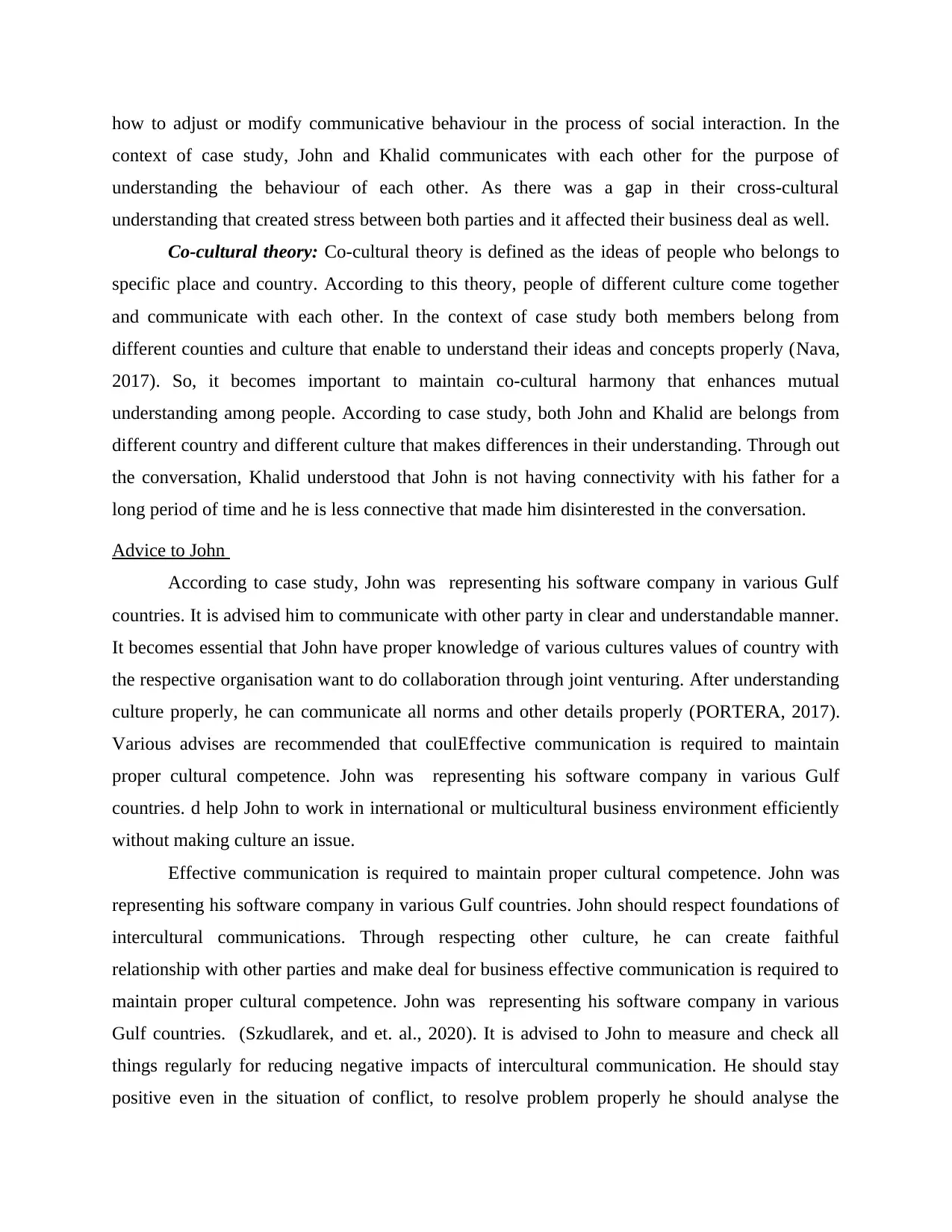
how to adjust or modify communicative behaviour in the process of social interaction. In the
context of case study, John and Khalid communicates with each other for the purpose of
understanding the behaviour of each other. As there was a gap in their cross-cultural
understanding that created stress between both parties and it affected their business deal as well.
Co-cultural theory: Co-cultural theory is defined as the ideas of people who belongs to
specific place and country. According to this theory, people of different culture come together
and communicate with each other. In the context of case study both members belong from
different counties and culture that enable to understand their ideas and concepts properly (Nava,
2017). So, it becomes important to maintain co-cultural harmony that enhances mutual
understanding among people. According to case study, both John and Khalid are belongs from
different country and different culture that makes differences in their understanding. Through out
the conversation, Khalid understood that John is not having connectivity with his father for a
long period of time and he is less connective that made him disinterested in the conversation.
Advice to John
According to case study, John was representing his software company in various Gulf
countries. It is advised him to communicate with other party in clear and understandable manner.
It becomes essential that John have proper knowledge of various cultures values of country with
the respective organisation want to do collaboration through joint venturing. After understanding
culture properly, he can communicate all norms and other details properly (PORTERA, 2017).
Various advises are recommended that coulEffective communication is required to maintain
proper cultural competence. John was representing his software company in various Gulf
countries. d help John to work in international or multicultural business environment efficiently
without making culture an issue.
Effective communication is required to maintain proper cultural competence. John was
representing his software company in various Gulf countries. John should respect foundations of
intercultural communications. Through respecting other culture, he can create faithful
relationship with other parties and make deal for business effective communication is required to
maintain proper cultural competence. John was representing his software company in various
Gulf countries. (Szkudlarek, and et. al., 2020). It is advised to John to measure and check all
things regularly for reducing negative impacts of intercultural communication. He should stay
positive even in the situation of conflict, to resolve problem properly he should analyse the
context of case study, John and Khalid communicates with each other for the purpose of
understanding the behaviour of each other. As there was a gap in their cross-cultural
understanding that created stress between both parties and it affected their business deal as well.
Co-cultural theory: Co-cultural theory is defined as the ideas of people who belongs to
specific place and country. According to this theory, people of different culture come together
and communicate with each other. In the context of case study both members belong from
different counties and culture that enable to understand their ideas and concepts properly (Nava,
2017). So, it becomes important to maintain co-cultural harmony that enhances mutual
understanding among people. According to case study, both John and Khalid are belongs from
different country and different culture that makes differences in their understanding. Through out
the conversation, Khalid understood that John is not having connectivity with his father for a
long period of time and he is less connective that made him disinterested in the conversation.
Advice to John
According to case study, John was representing his software company in various Gulf
countries. It is advised him to communicate with other party in clear and understandable manner.
It becomes essential that John have proper knowledge of various cultures values of country with
the respective organisation want to do collaboration through joint venturing. After understanding
culture properly, he can communicate all norms and other details properly (PORTERA, 2017).
Various advises are recommended that coulEffective communication is required to maintain
proper cultural competence. John was representing his software company in various Gulf
countries. d help John to work in international or multicultural business environment efficiently
without making culture an issue.
Effective communication is required to maintain proper cultural competence. John was
representing his software company in various Gulf countries. John should respect foundations of
intercultural communications. Through respecting other culture, he can create faithful
relationship with other parties and make deal for business effective communication is required to
maintain proper cultural competence. John was representing his software company in various
Gulf countries. (Szkudlarek, and et. al., 2020). It is advised to John to measure and check all
things regularly for reducing negative impacts of intercultural communication. He should stay
positive even in the situation of conflict, to resolve problem properly he should analyse the
⊘ This is a preview!⊘
Do you want full access?
Subscribe today to unlock all pages.

Trusted by 1+ million students worldwide
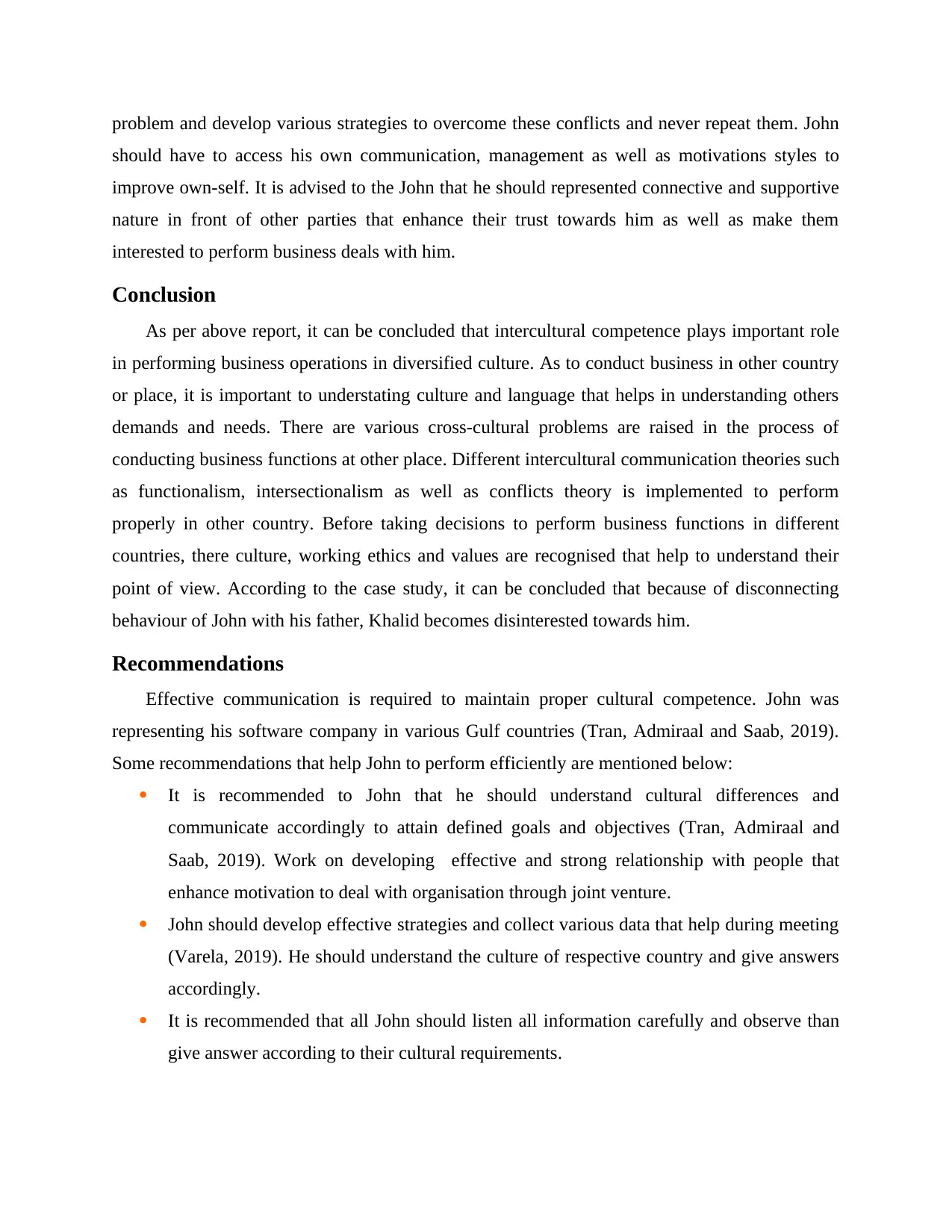
problem and develop various strategies to overcome these conflicts and never repeat them. John
should have to access his own communication, management as well as motivations styles to
improve own-self. It is advised to the John that he should represented connective and supportive
nature in front of other parties that enhance their trust towards him as well as make them
interested to perform business deals with him.
Conclusion
As per above report, it can be concluded that intercultural competence plays important role
in performing business operations in diversified culture. As to conduct business in other country
or place, it is important to understating culture and language that helps in understanding others
demands and needs. There are various cross-cultural problems are raised in the process of
conducting business functions at other place. Different intercultural communication theories such
as functionalism, intersectionalism as well as conflicts theory is implemented to perform
properly in other country. Before taking decisions to perform business functions in different
countries, there culture, working ethics and values are recognised that help to understand their
point of view. According to the case study, it can be concluded that because of disconnecting
behaviour of John with his father, Khalid becomes disinterested towards him.
Recommendations
Effective communication is required to maintain proper cultural competence. John was
representing his software company in various Gulf countries (Tran, Admiraal and Saab, 2019).
Some recommendations that help John to perform efficiently are mentioned below:
It is recommended to John that he should understand cultural differences and
communicate accordingly to attain defined goals and objectives (Tran, Admiraal and
Saab, 2019). Work on developing effective and strong relationship with people that
enhance motivation to deal with organisation through joint venture.
John should develop effective strategies and collect various data that help during meeting
(Varela, 2019). He should understand the culture of respective country and give answers
accordingly.
It is recommended that all John should listen all information carefully and observe than
give answer according to their cultural requirements.
should have to access his own communication, management as well as motivations styles to
improve own-self. It is advised to the John that he should represented connective and supportive
nature in front of other parties that enhance their trust towards him as well as make them
interested to perform business deals with him.
Conclusion
As per above report, it can be concluded that intercultural competence plays important role
in performing business operations in diversified culture. As to conduct business in other country
or place, it is important to understating culture and language that helps in understanding others
demands and needs. There are various cross-cultural problems are raised in the process of
conducting business functions at other place. Different intercultural communication theories such
as functionalism, intersectionalism as well as conflicts theory is implemented to perform
properly in other country. Before taking decisions to perform business functions in different
countries, there culture, working ethics and values are recognised that help to understand their
point of view. According to the case study, it can be concluded that because of disconnecting
behaviour of John with his father, Khalid becomes disinterested towards him.
Recommendations
Effective communication is required to maintain proper cultural competence. John was
representing his software company in various Gulf countries (Tran, Admiraal and Saab, 2019).
Some recommendations that help John to perform efficiently are mentioned below:
It is recommended to John that he should understand cultural differences and
communicate accordingly to attain defined goals and objectives (Tran, Admiraal and
Saab, 2019). Work on developing effective and strong relationship with people that
enhance motivation to deal with organisation through joint venture.
John should develop effective strategies and collect various data that help during meeting
(Varela, 2019). He should understand the culture of respective country and give answers
accordingly.
It is recommended that all John should listen all information carefully and observe than
give answer according to their cultural requirements.
Paraphrase This Document
Need a fresh take? Get an instant paraphrase of this document with our AI Paraphraser

As in the case study, there is cross-culture conflict is found that impacts overall conversation
(Varela, 2019). So these cultural barriers could be overcome through developing effective
strategies and policies.
(Varela, 2019). So these cultural barriers could be overcome through developing effective
strategies and policies.
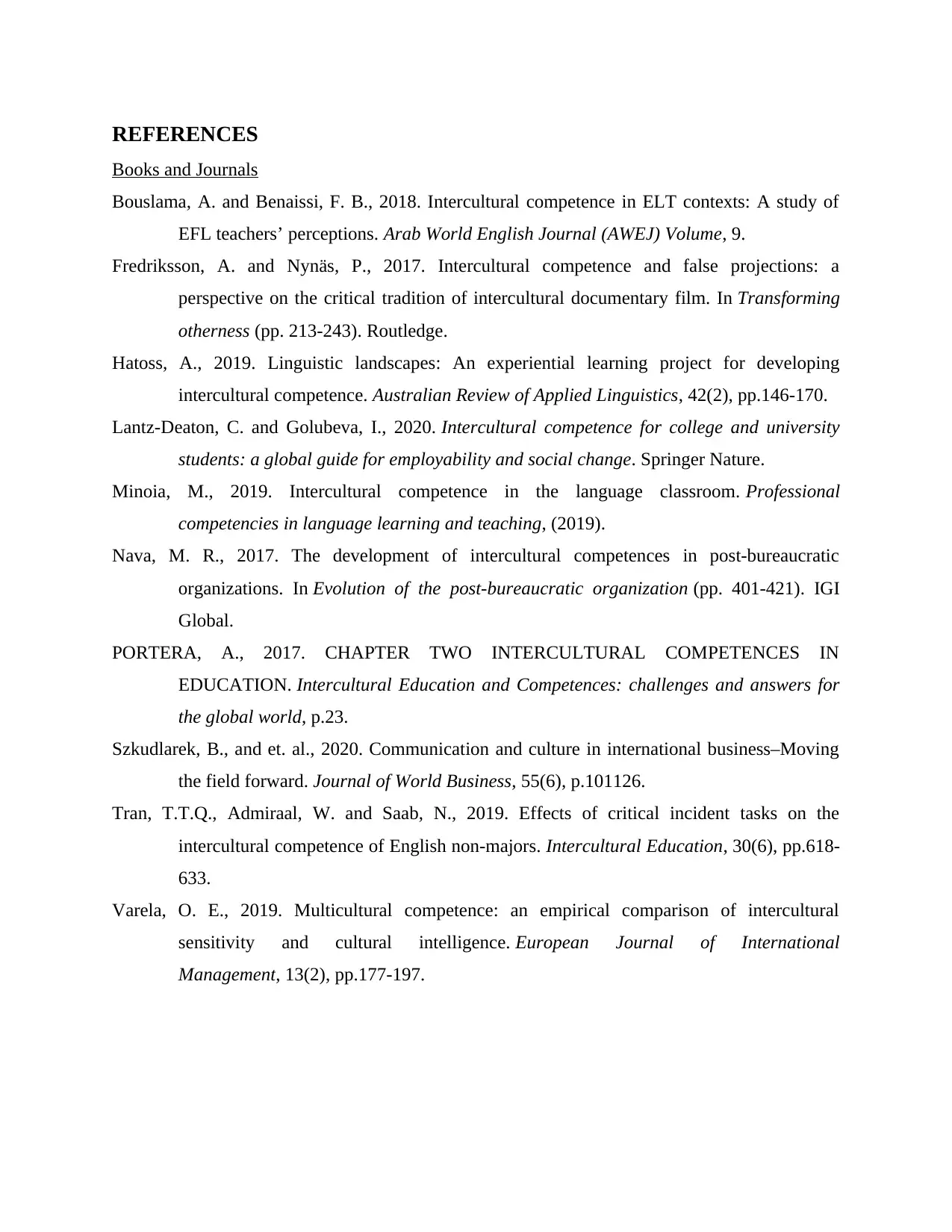
REFERENCES
Books and Journals
Bouslama, A. and Benaissi, F. B., 2018. Intercultural competence in ELT contexts: A study of
EFL teachers’ perceptions. Arab World English Journal (AWEJ) Volume, 9.
Fredriksson, A. and Nynäs, P., 2017. Intercultural competence and false projections: a
perspective on the critical tradition of intercultural documentary film. In Transforming
otherness (pp. 213-243). Routledge.
Hatoss, A., 2019. Linguistic landscapes: An experiential learning project for developing
intercultural competence. Australian Review of Applied Linguistics, 42(2), pp.146-170.
Lantz-Deaton, C. and Golubeva, I., 2020. Intercultural competence for college and university
students: a global guide for employability and social change. Springer Nature.
Minoia, M., 2019. Intercultural competence in the language classroom. Professional
competencies in language learning and teaching, (2019).
Nava, M. R., 2017. The development of intercultural competences in post-bureaucratic
organizations. In Evolution of the post-bureaucratic organization (pp. 401-421). IGI
Global.
PORTERA, A., 2017. CHAPTER TWO INTERCULTURAL COMPETENCES IN
EDUCATION. Intercultural Education and Competences: challenges and answers for
the global world, p.23.
Szkudlarek, B., and et. al., 2020. Communication and culture in international business–Moving
the field forward. Journal of World Business, 55(6), p.101126.
Tran, T.T.Q., Admiraal, W. and Saab, N., 2019. Effects of critical incident tasks on the
intercultural competence of English non-majors. Intercultural Education, 30(6), pp.618-
633.
Varela, O. E., 2019. Multicultural competence: an empirical comparison of intercultural
sensitivity and cultural intelligence. European Journal of International
Management, 13(2), pp.177-197.
Books and Journals
Bouslama, A. and Benaissi, F. B., 2018. Intercultural competence in ELT contexts: A study of
EFL teachers’ perceptions. Arab World English Journal (AWEJ) Volume, 9.
Fredriksson, A. and Nynäs, P., 2017. Intercultural competence and false projections: a
perspective on the critical tradition of intercultural documentary film. In Transforming
otherness (pp. 213-243). Routledge.
Hatoss, A., 2019. Linguistic landscapes: An experiential learning project for developing
intercultural competence. Australian Review of Applied Linguistics, 42(2), pp.146-170.
Lantz-Deaton, C. and Golubeva, I., 2020. Intercultural competence for college and university
students: a global guide for employability and social change. Springer Nature.
Minoia, M., 2019. Intercultural competence in the language classroom. Professional
competencies in language learning and teaching, (2019).
Nava, M. R., 2017. The development of intercultural competences in post-bureaucratic
organizations. In Evolution of the post-bureaucratic organization (pp. 401-421). IGI
Global.
PORTERA, A., 2017. CHAPTER TWO INTERCULTURAL COMPETENCES IN
EDUCATION. Intercultural Education and Competences: challenges and answers for
the global world, p.23.
Szkudlarek, B., and et. al., 2020. Communication and culture in international business–Moving
the field forward. Journal of World Business, 55(6), p.101126.
Tran, T.T.Q., Admiraal, W. and Saab, N., 2019. Effects of critical incident tasks on the
intercultural competence of English non-majors. Intercultural Education, 30(6), pp.618-
633.
Varela, O. E., 2019. Multicultural competence: an empirical comparison of intercultural
sensitivity and cultural intelligence. European Journal of International
Management, 13(2), pp.177-197.
⊘ This is a preview!⊘
Do you want full access?
Subscribe today to unlock all pages.

Trusted by 1+ million students worldwide

1 out of 10
Related Documents
Your All-in-One AI-Powered Toolkit for Academic Success.
+13062052269
info@desklib.com
Available 24*7 on WhatsApp / Email
![[object Object]](/_next/static/media/star-bottom.7253800d.svg)
Unlock your academic potential
Copyright © 2020–2026 A2Z Services. All Rights Reserved. Developed and managed by ZUCOL.





